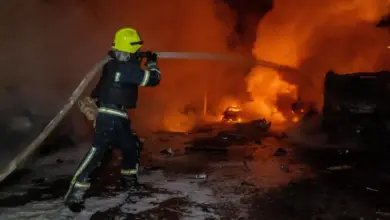KABUL, Afghanistan – The governor of a province in northeastern Afghanistan said Monday a NATO airstrike killed four police officers at a checkpoint in the remote, mountainous region.
Jamaluddin Badar said the strike took place late Sunday in the Wama district of Nuristan province, a lawless, rugged area near the border with Pakistan. He said coalition forces detained 12 police officers following the airstrike.
NATO said it was aware of the reports of a friendly fire incident and is investigating.
Mistaken airstrikes and night-raids are the leading cause of tension between the US-led coalition and the Afghan government. President Hamid Karzai has demanded that the coalition take steps to ensure that airstrikes do not cause accidental deaths. The United Nations said in its midyear report that airstrikes conducted by the US-led coalition remained the leading cause of civilian deaths by pro-government forces.
Badar condemned the incident, which he said occurred "while the flag of Afghanistan flew from the checkpoint and all police were in uniform."
"The repetition of such mistakes will have a bad effect on the police ranks in the province," he warned in a statement. It is unclear how many forces the US-led coalition has in the province, where security is provided largely by a small force of Afghan police.
Although Taliban-caused civilian deaths outnumber the coalition's by more than four-to-one, Adm. Mike Mullen, chairman of the Joint Chiefs of Staff, told reporters in Kabul on Sunday that reducing them was a top priority for international forces.
"We are working hard to completely eliminate these casualties," He said.
Mullen also said the US-led coalition will intensify its efforts to fight insurgents in the east after focusing its campaign for the past year in southern Afghanistan – especially in the provinces of Helmand and Kandahar. The coalition has claimed significant security gains in the south, but violence has been escalating around the country in the months following the start of a Taliban offensive in April.
Much of that focus will be on reaching some kind of agreement with Pakistan to try and address the issue of safe havens, especially those used by the Al-Qaeda-linked Haqqani network.
"There has been frustration with the speed with which that has been addressed," he said. "Pakistan is home to many, many terrorists. They are the home to Al-Qaeda, who is still an organization that plots to kill as many Americans as possible."




